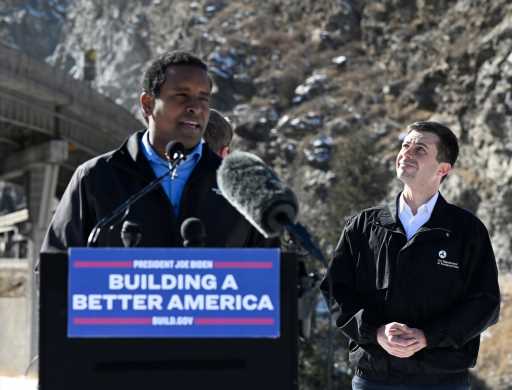IDAHO SPRINGS — The nation’s top transportation official looked out at one of Colorado’s most substandard stretches of interstate highway Thursday as he and others detailed new federal aid coming to the state in coming years.
That money, from a $1 trillion bipartisan infrastructure bill passed by Congress last fall, will supercharge state transportation-funding plans approved in the last year. The foot of Floyd Hill along Interstate 70, which is pegged for the state’s next mega-project, also played host last June to Gov. Jared Polis’ signing of a $5.4 billion state transportation bill that created several new fees to raise money.
“I want to make clear: That kind of leadership and commitment at the state level means that states like Colorado are especially well positioned to hit the ground running and take advantage of the federal legislation and the federal funding that is coming your way,” U.S. Transportation Secretary Pete Buttigieg said during the afternoon news conference.
He was joined by Polis as well as both of Colorado’s U.S. senators, all Democrats who were there to promote the Biden administration’s signature legislative achievement.
But amid the big numbers thrown around and the rhetorical back-patting, there was a recognition that Coloradans are set to see substantial sums spent on transportation — and not just on roads.
The Colorado Department of Transportation recently estimated it will receive $3.9 billion from the federal infrastructure bill over the next five years. While much of that is a continuation of past formula funding, CDOT says its annual allotment will rise roughly $210 million. It will come from increases in federal formulas as well as new programs aimed at fixing bridges, expanding electric vehicle infrastructure, reducing carbon emissions and increasing the resiliency of the transportation system.
The infrastructure bill also includes a significant increase in annual federal funding for transit agencies across Colorado, though that’s mostly for their capital programs. CDOT estimates federal transit funding will amount to $183 million a year for the next five years.
Buttigieg, a 2020 Democratic presidential hopeful who joined President Joe Biden’s administration, was in Colorado through Friday to highlight the bill’s impact. Earlier Thursday, he joined Denver Mayor Michael Hancock at an event in the city to promote recent investments in electric vehicle charging stations.
On Friday, the secretary will tour Glenwood Canyon — where CDOT is still cleaning up from last summer’s mudslides — and visit a Roaring Fork Transportation Authority transit facility in Glenwood Springs. The RFTA’s buses connect Glenwood Springs to Aspen and other communities.
On Floyd Hill, a recurring westbound ski traffic choke point caused by a bottleneck and sharp curves on aging bridges, I-70 is due for a $700 million rebuilding and partial widening project. Plans include new viaducts, with major work extending all the way west to the Veterans Memorial Tunnels. CDOT recently selected the lead contractors for what’s expected to be a five-year undertaking, with main construction starting next year.
It isn’t fully funded yet, and CDOT plans to seek competitive federal grants, possibly including some set in motion by the infrastructure bill.
“We’re here today to say that we’re going to start this project with state money,” U.S. Sen. Michael Bennet said, adding a nudge in Buttigieg’s direction: “And we hope we’re gonna have some federal money to complete the project.”
While some environmentalists have decried the project as wasteful and counter-productive to the state’s climate goals, others have acknowledged safety problems on the stretch.
Asked about the infrastructure bill’s massive road spending, Buttigieg said addressing climate change is important, and he said several components balance out the bill by supporting cleaner vehicles and boosting alternatives to driving. He lauded Colorado’s recent adoption of greenhouse gas emission-reduction goals for transportation planning.
“We’re always gonna have roads. We’re always gonna have cars,” he said. “But it’s no longer the be-all, end-all of transportation policy — and I think decision-makers in Colorado have reflected that insight into their choices.”
Source: Read Full Article

